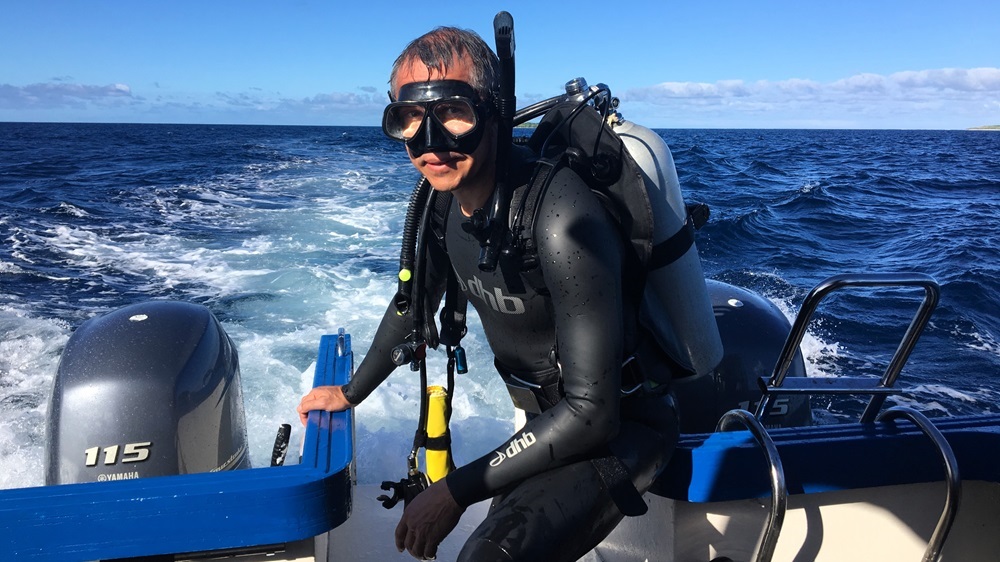The world of videography and filmmaking is constantly evolving, with new technologies pushing the boundaries of what’s possible. The latest of these technologies is 8K resolution video which offers a new level of detail and clarity that was previously unimaginable.
With 8K, filmmakers and videographers can capture images — both above and below sea level — in incredible precision and realism, giving TV viewers a truly immersive viewing experience.
Pawel Achtel is a world-renowned professional in underwater cinematography with a career spanning over 35 years and more than 5,000 dives ranging from the equator to Antarctica
Meet Pawel Achtel, a world-renowned professional in underwater cinematography with a career spanning over 35 years and more than 5,000 dives ranging from the equator to Antarctica. The filmmaker’s extensive diving experience informs his cinematographic work — which has captured the attention of industry leaders such as National Geographic, BBC and Discovery — providing a unique perspective on life underwater and highlighting his expertise in designing and producing advanced cinematography equipment. He was also involved in capturing 8K resolution underwater sequences for “Avatar: The Way of Water.”
Samsung Newsroom sat down with Pawel Achtel to dive into the details of underwater cinematography and explore how Samsung’s Neo QLED 8K lineup is reshaping the landscape for filmmakers and viewers at home.
How 8K Technology Transforms Underwater Filmmaking
In fields like underwater cinematography, where visuals matter most, Samsung’s Neo QLED 8K is indispensable. Not only does it help viewers feel immersed in the scene, but it is also vital for filmmakers to assess underwater footage.
Due to variables like ocean currents and light refraction, filming underwater in true 8K quality can be difficult. “But, when all the circumstances line up, the results are breathtaking,” shared Achtel.
While advanced technologies like submersible lenses assist in capturing these shots, Neo QLED 8K — known for its high resolution and clarity — allows filmmakers like Achtel to closely examine even the smallest details of underwater scenes. This close look helps improve sharpness and other aspects of image quality after filming, overcoming the challenges of underwater optics.
“The underwater world is elusive — and filmmakers have a rare opportunity to allow people to see it in great detail, in a way people may not see elsewhere,” said Achtel. “It makes these shots interesting and captivating as they reveal an environment completely foreign to us in stunning detail.”
Samsung made waves at CES 2024 by introducing the latest Neo QLED 8K with the new NQ8 AI Gen3 processor, delivering a cinematic experience at home. Impressed by its features, the filmmaker called the TV “a transformative advancement.”
He specifically praised features like 8K AI Upscaling Pro and AI Motion Enhancer Pro[1], available on select Neo QLED 8K models, highlighting Samsung’s commitment to outstanding visuals. “Having witnessed the advanced features at CES 2024, I can confidently say they enhance realism and immersion,” added Achtel.
However, for this underwater cinematographer, the true power of 8K lies in the seamless integration of production and viewing technologies — charting a new course in content creation and consumption.
Diving Deep Into 8K Home Cinema
As the development and adoption of 8K filming equipment continues to grow, it’s also driving the creation of content that fully embraces the potential of 8K resolution. The unparalleled realism and captivating qualities of 8K make it an essential tool for storytelling, especially for content that demands a powerful visual impact.
Take underwater footage, for example, which is often played at a slower pace — giving audiences the time to absorb unfamiliar environments and take in details that might otherwise go unnoticed.
Various factors including currents and light refraction present challenges for capturing clear, beautiful shots underwater
On the Neo QLED 8K, viewers can appreciate the “impressive color accuracy” and “nuanced portrayal of detailed scenes” of the ocean’s depths. From the calming blue water to the vivid and bright hues of fish and coral reefs, Achtel attributes the appeal of his 8K underwater imagery to the variety of striking colors and patterns. With Neo QLED 8K, the benefits now extend beyond just the content itself.
“On the viewing side, Neo QLED 8K plays a pivotal role in bringing the 8K ecosystem to life,” he explained. “It not only showcases content with remarkable clarity but also upscales lower-resolution footage to nearly 8K quality, ensuring an immersive viewing experience of the highest caliber.”
Given its advanced picture quality powered by increased neural networks and cutting-edge AI upscaling features, Neo QLED 8K elevates the viewing experience — even with content not initially captured in 8K. Combining advanced image quality with larger screen sizes also opens new possibilities for home viewing to offer an experience that rivals that of traditional big-screen setups.
In the ever-evolving landscape of visual storytelling, enhancing a TV’s ability to process non-8K content offers significant benefits and inspires filmmakers to strive for higher quality content.
“At the end of the day, having a device with an enhanced visual experience and immersive capabilities empowers cinematographers to craft and evaluate captivating content that resonates deeply with viewers,” said Achtel.
AI Motion Enhancer Pro helps make 8K viewing experiences even smoother, not only for underwater scenes but also footages with fast-paced action like artists dancing on stage or sporting events
The role of 8K technology in underwater cinematography and home entertainment underscores its transformative potential to enhance visual storytelling and enrich the viewing experience for audiences around the world.

